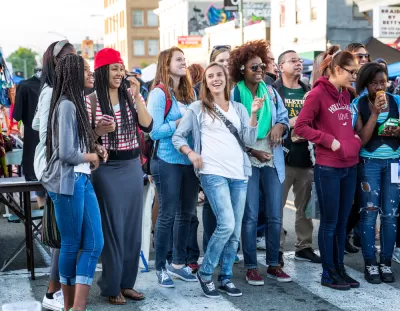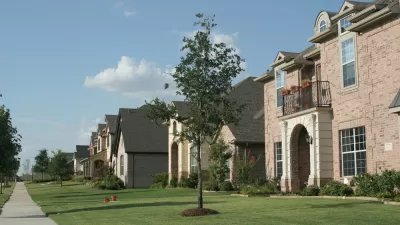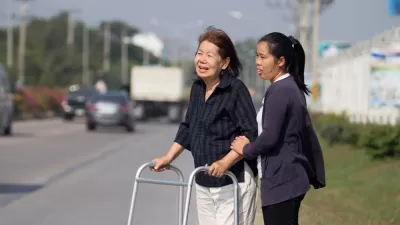Despite the impression that young white people have reshaped cities' demographics, research shows that non-white Millennials account for the greater part of that growth.

In the midst of a debate over "Millennial exodus" from urban cores, William H. Frey points out that the common image of the white Millennial gentrifier doesn't give the whole picture. To begin with, "nearly three-fifths of millennials residing in core urban counties are racial minorities, where more than a quarter are Hispanic, 18 percent are black, and the rest other races."
Moreover, minorities dominate recent urban growth among young adults. "While white millennial gentrification is often cited as a source of youthful urban change, racial minorities were clearly major drivers of young adult growth in all urban and suburban categories in the first half of the decade." In areas closer to the urban core, the trend is even more pronounced.
Looking at the nation's 100 largest metro areas, Frey reports that "Thirty of these areas are 'minority white,' including Miami at 25 percent white and Houston at 32 percent. Several California areas (Los Angeles, Riverside, San Jose, Stockton, Fresno, and Bakersfield) are less than one-third white. Other notable metropolitan areas where whites constitute a minority of millennials are New York City, Atlanta, and Chicago."
"Of the 99 metropolitan areas in which young adult populations grew between 2010-2015 (Birmingham, Ala. took a loss), minorities contributed to more than three quarters of that growth in 51 of them and more than half of the growth in all but 11 of those areas."
FULL STORY: Minorities are the demographic engine of millennial urban growth

Planetizen Federal Action Tracker
A weekly monitor of how Trump’s orders and actions are impacting planners and planning in America.

Maui's Vacation Rental Debate Turns Ugly
Verbal attacks, misinformation campaigns and fistfights plague a high-stakes debate to convert thousands of vacation rentals into long-term housing.

Restaurant Patios Were a Pandemic Win — Why Were They so Hard to Keep?
Social distancing requirements and changes in travel patterns prompted cities to pilot new uses for street and sidewalk space. Then it got complicated.

In California Battle of Housing vs. Environment, Housing Just Won
A new state law significantly limits the power of CEQA, an environmental review law that served as a powerful tool for blocking new development.

Boulder Eliminates Parking Minimums Citywide
Officials estimate the cost of building a single underground parking space at up to $100,000.

Orange County, Florida Adopts Largest US “Sprawl Repair” Code
The ‘Orange Code’ seeks to rectify decades of sprawl-inducing, car-oriented development.
Urban Design for Planners 1: Software Tools
This six-course series explores essential urban design concepts using open source software and equips planners with the tools they need to participate fully in the urban design process.
Planning for Universal Design
Learn the tools for implementing Universal Design in planning regulations.
Heyer Gruel & Associates PA
JM Goldson LLC
Custer County Colorado
City of Camden Redevelopment Agency
City of Astoria
Transportation Research & Education Center (TREC) at Portland State University
Jefferson Parish Government
Camden Redevelopment Agency
City of Claremont





























